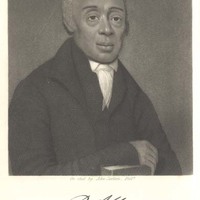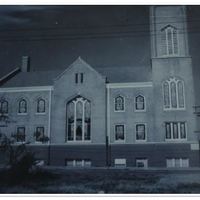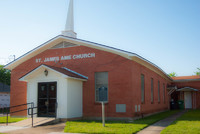African Methodist Episcopal Church
AFRICAN METHODIST EPISCOPAL CHURCH. The African Methodist Episcopal (AME) Church officially organized in 1816 in Philadelphia, Pennsylvania, under the leadership Rev. Richard Allen. The AME Church originally grew out of the Free African Society (FAS) in 1787, in Philadelphia, also led by Rev. Allen. Before the organization of the AME Church, many African American Methodists attended the predominantly white Methodist Episcopal (ME) Church, but due to decades of racial segregation within the ME Church, many African Americans in the New England region formed their own Methodist denominations, including the African Methodist Episcopal (AME) Zion Church.
The AME Church’s membership spiked as they were permitted to operate in the South after the Civil War. Missionary organizations from the AME Church and other Methodist denominations were crucial in forming the earliest AME congregations and providing education for freedmen and women. M.M. Clark led the first efforts to form the first AME Church missionary in Galveston, Texas, in 1866. The first annual Texas conference of the AME Church met in 1868, in Galveston. By 1890, AME membership in Texas reached to 23,000 and membership reached to 32,000 by 1926, second behind only the African American Baptists.
In Denton County, there were at least two AME churches that organized during the late-nineteenth or early twentieth centuries, including St. Mark AME, in Pilot Point and St. James AME, in Denton. Denton County AME churches, like other predominantly African American congregations, formed networks with other North Texas churches through the West Texas Conference that organized in 1875. Before the formation of the West Texas Conference, the Texas Conference founded Paul Quinn College, where at least a few African Americans from Denton County attended.
Map of AME Churches in North Texas
This map shows current AME churches that organized between 1865-1930 in Dallas, Denton, Ellis, Grayson, Johnson and Tarrant Counties.
Citations: C. Eric Lincoln and Lawrence H. Mamiya, The Black Church in the African American Experience (Durham: Duke University Press, 1990), 47-53; Handbook of Texas Online, William E. Montgomery, "African Methodist Episcopal Church," http://www.tshaonline.org/handbook/online/articles/ima02. Uploaded on June 9, 2010. Published by the Texas State Historical Association; Lincoln & Lawrence, The Black Church in the African American Experience, 52; Ibid.


